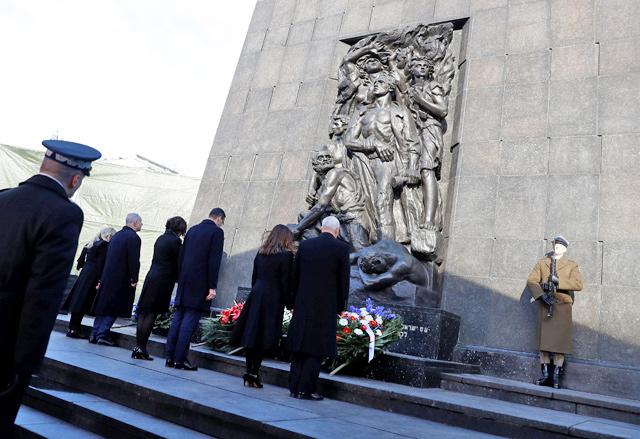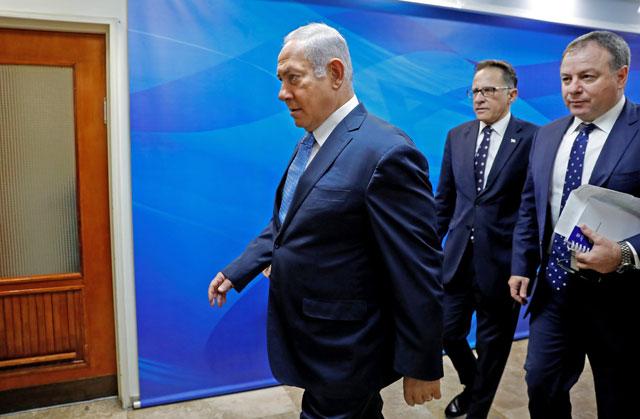You are here
Pence demands EU isolate Iran as Israelis, Arabs unite
By AFP - Feb 14,2019 - Last updated at Feb 14,2019

Israeli Prime Minister Benjamin Netanyahu, his wife Sara, US Vice President Mike Pence, his wife Karen, Poland's Prime Minister Mateusz Morawiecki and his wife Iwona attend a wreath-laying ceremony at the Monument to the Ghetto Heroes in Warsaw, Poland, on Thursday (Reuters photo)
WARSAW — US Vice President Mike Pence demanded on Thursday that Europeans drop a nuclear deal with Iran and join in seeking to cripple the regime, a cause that united Israel with longtime Arab rivals at a conference in Warsaw.
Major European powers sent low-level representation to the US-initiated meeting, suspicious of US President Donald Trump's hawkish impulses and convinced the 2015 deal under which Iran drastically scaled back its nuclear programme is working.
But Pence took direct aim at allies Britain, France and Germany, denouncing their new initiative to let European companies operate in Iran in defiance of unilateral US sanctions.
"It's an ill-advised step that will only strengthen Iran, weaken the EU and creates still more distance between Europe and the United States," he said.
"The time has come for our European partners to withdraw from the Iran nuclear deal and join with us," he said.
The Warsaw conference is timed just as Iran's clerical regime celebrates 40 years since the Islamic revolution ousted the pro-US shah.
Iranian President Hassan Rouhani, visiting the Russian resort of Sochi for a simultaneous summit called by Russian leader Vladimir Putin that also included Turkey, retorted: "we see what's happening in Warsaw, it's an empty result, nothing."
Pence stopped just short of calling for regime change in Iran, which has been comparatively stable in recent years amid unrest throughout the Middle East.
Pence threatened further US sanctions as "the people of Iran take to the streets" and its "economy continues to plummet".
He accused Iran of plotting a "new Holocaust" with its opposition to Israel and regional ambitions in Syria, Lebanon, Iraq and Yemen.
"Freedom-loving nations must stand together and hold the Iranian regime accountable for the evil and violence it has inflicted on its people, on the region and the wider world," Pence said.
EU rejects pressure
Pence tacitly acknowledged that Iran is in compliance with the 2015 nuclear deal but said the issue was the accord itself, brokered under Trump's predecessor Barack Obama.
European leaders say the agreement was never meant to address all concerns with Iran and that Tehran is hardly the only problematic player in the region.
"Europe is not divided on the issue of Iran. Europe supports the nuclear accord with Iran," German foreign ministry official Niels Annen told reporters.
Another senior official from a major European power said "we strongly disagree" with Pence's remarks and said that other regional issues such as Syria and Yemen would be even more difficult to resolve if Iran is isolated.
"We are strongly against coalition-building and a coercion-only approach," he said.
Poland — which is eager to please the United States amid fears of a resurgent Russia — said it also backed the nuclear deal but that it was important to raise concerns.
"The discussion showed that the EU and the United States shared the diagnosis of the situation, and have similar views regarding the problems in the Middle East, and also, let's say it openly — the negative role played by Iran," Polish Foreign Minister Jacek Czaputowicz said at the close of the conference.
Pence only briefly mentioned concerns with Iran's Arab adversaries, saying the Trump administration would keep looking at Saudi Arabia's killing of US-based dissident Jamal Khashoggi.
But Pence hailed the Arab front against Iran.
Top officials of Saudi Arabia, the United Arab Emirates and Bahrain — none of which recognise Israel — sat down with Prime Minister Benjamin Netanyahu in Warsaw starting with a dinner on Wednesday at the Royal Castle.
Netanyahu called the talks a "historical turning point" and voiced hope they could lead to a greater normalisation of relations.
"An Israeli prime minister and the foreign ministers of the leading Arab countries stood together and spoke with unusual force, clarity and unity against the common threat of the Iranian regime," Netanyahu told reporters as he arrived for Thursday's main session at a football stadium.
Israel only has diplomatic relations with two Arab countries, neighbouring Egypt and Jordan.
US promotes peace plan
Jared Kushner, Trump's son-in-law and adviser, made a rare public appearance to brief countries on plans for an elusive peace deal between Israel and the Palestinians.
He plans to present a package after Israel holds elections on April 9.
Another senior European official who listened to the closed-door presentation was underwhelmed.
"Nothing new at all. It is obvious that everybody is now waiting for the outcome of Israeli elections," the official told AFP on condition of anonymity.
The Palestinian Authority says it can no longer trust the United States as a broker after Trump in 2017 recognised Jerusalem — holy to the three major monotheistic religions — as Israel's capital.
Nabil Shaath, an adviser to Palestinian president Mahmud Abbas, wrote in Israel's Haaretz newspaper that the Warsaw meeting has "tried to normalise the Israeli occupation and the systematic denial of the Palestinian right to self-determination".
Pence said that the United States wanted a "lasting peace" but that it "will never fail to stand with our ally Israel".
Related Articles
WARSAW — The United States is seeking this week in Warsaw to rally the world behind a vision of the Middle East that includes maximum pressu
OCCUPIED JERUSALEM — Israeli Prime Minister Benjamin Netanyahu on Wednesday accused European leaders of "appeasing" Iran instead of confront
DOHA — US sanctions on Iran will not impact Qatar Airways' flights to the Islamic republic, the airline's boss Akbar Al Baker said on Monday

















